China Reported To Have Deployed Missiles On Disputed Island In South China Sea, Foreign Minister Defends Right To ‘Self-Defense’
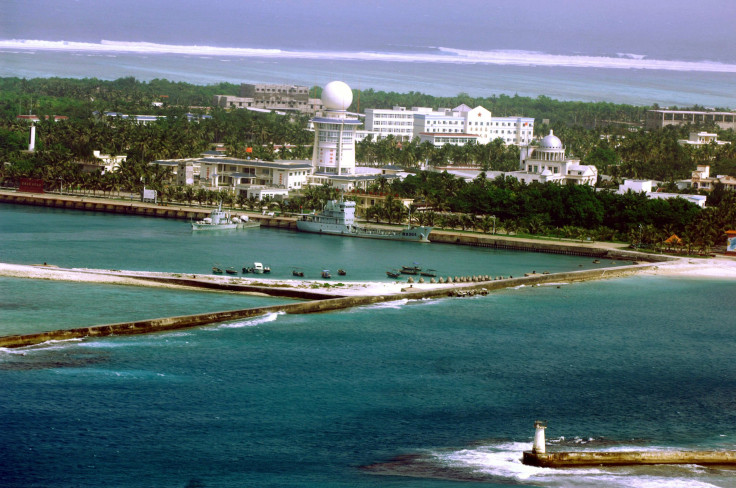
SHANGHAI — China’s foreign minister has implicitly defended the country’s right to station missiles on islands it occupies in disputed waters in the South China Sea. Chinese Foreign Minister Wang Yi’s comments follow media reports, later confirmed by the governments of the U.S. and Taiwan, that Beijing had deployed mobile surface missile batteries on Woody Island in the Paracel chain at some point in recent weeks.
Analysts say the deployment, the first of its kind in the region, would add to tensions in an already disputed area, and may be Beijing’s response to recent “freedom of navigation operations” in the region by the U.S. military, as well as to the planned deployment of a U.S. missile defense system in China’s neighbor South Korea.
Speaking after a meeting with visiting Australian Foreign Minister Julie Bishop, Wang did not comment directly on the missile deployments, other than to suggest that reports on the topic were an attempt by “western media to create news stories.” However, he did not deny the reports, which were accompanied by recent photographs, and he rejected the outside world’s right to criticize any such developments.
“As for the limited and necessary self defense facilities China has built on islands and reefs stationed by Chinese personnel, that is consistent with the self defense and self preservation China is entitled to under international law,” Wang said, according to the Guardian.
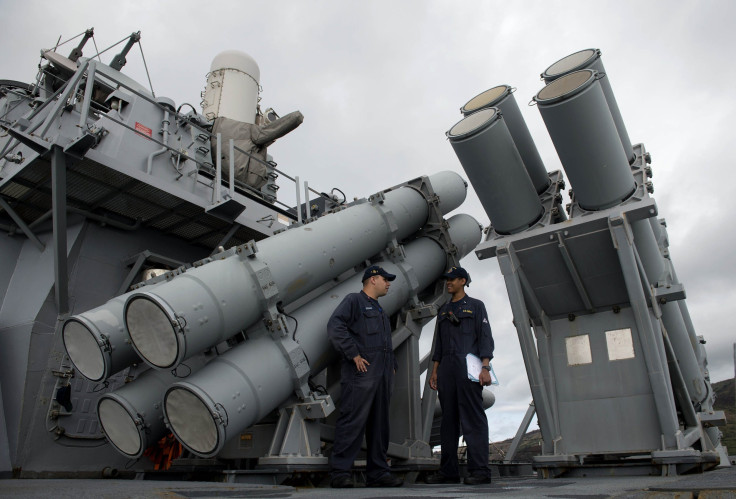
Tension in the region has grown over the past two years, as China has reclaimed land on a number of tidal reefs in the neighboring Spratlys Chain, which is claimed in part or full by a number of countries including Vietnam and the Philippines.
Wang reiterated Beijing’s claims that the structures it has been building on the reclaimed islands, including lighthouses and meteorological stations, are for “the public good,” and will help with navigation and sea rescues in the disputed waters.
Western analysts have said several runways built by Beijing on the reclaimed islands would be big enough for military aircraft to use in the event of any clashes with its rivals for sovereignty in the region. China says the islands are its territory, and notes that other countries have also reclaimed land in the South China Sea — though observers say none have done so on such a scale.
Beijing was reported to have pledged not to militarize the region during the summit meeting between Chinese President Xi Jinping and U.S. President Barack Obama in Washington last September. And Harry Harris, commander of the U.S. Pacific Command, said Wednesday in Japan that such a missile deployment would amount to “a militarization of the South China Sea in ways that President Xi said he would not do,” Reuters reported.
Some reports, however, now say that the pledge may have referred only to the Spratly Islands, not to other island chains including the Paracel. And Chinese academics and official media have also warned on several occasions that the Freedom of Navigation Operations (FONOPS) carried out by U.S. military ships and aircraft close to the islands in recent months could give Beijing no choice but to militarize the region. China has expressed particular anger at the most recent U.S. mission, in late January, since it was close to islands in the Paracel that Beijing has occupied for many decades.
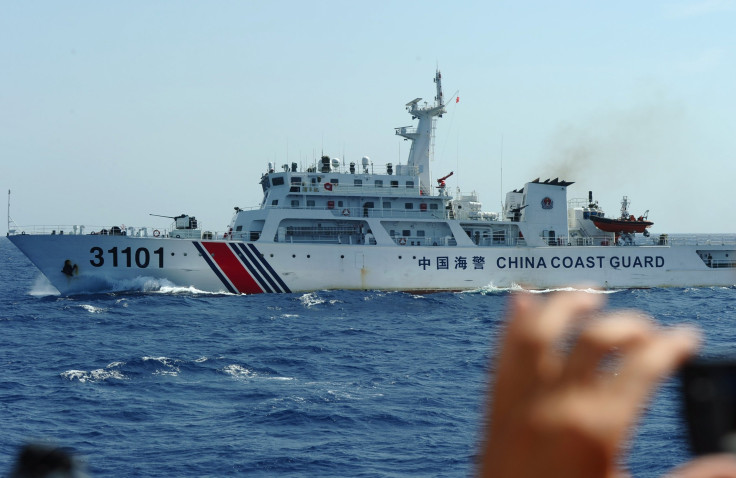
Analysts said that the deployment of missiles on Woody Island, the largest of the Paracel, may have been designed to signal an increasingly assertive Chinese regime’s dissatisfaction with recent developments. China has already built runways on Woody Island, and was reported to have deployed fighter planes there last October.
Willy Lam, a specialist on Chinese politics at the Chinese University of Hong Kong, told International Business Times that “the deployment of missiles on Woody Island” and other islands in the region, “has been long planned.” However, he said the revelation of the deployment at this moment may have been designed as “propaganda warfare against the FONOPS developments."
Lam also noted that the revelation coincided with the just concluded meeting between U.S. President Barack Obama and leaders of the Association of Southeast Asian Nations (ASEAN) in California, at which the South China Sea issue was discussed. While the U.S. has said it has no vested interest in the region, the White House said ahead of the meeting that any dispute between countries in the South China Sea should be solved peacefully, and not by a big nation “bullying” smaller neighbors — an apparent reference to China. After the meeting Obama stressed that the U.S. intended to continue its Freedom of Navigation Operations, which Washington says are designed to show that the sea around the reclaimed islands remains international waters, adding: “We will support the right of other countries to do the same.”
Beijing has said that the ASEAN forum was not the right place to discuss the South China Sea issue, and has accused the U.S. of interfering in the matter. And Lam said the missile deployment may have been designed as “a show of force to scare the ASEAN members, who are dependent on China economically, [at a time] when the U.S. is trying to rally ASEAN members against China.”
Chinese anger over the issue was highlighted Wednesday in a commentary in the Global Times, a hawkish tabloid published by the official People’s Daily, by Yin Chengde, a former counselor of the Chinese embassy in the U.S. Yin described the FONOPS missions as “gunboat diplomacy” and “unreasonable and arrogant.” He said they were being used as an excuse to challenge China’s sovereignty as part of a plan to "contain China." Yin said China sought “peaceful development” and had never triggered an incident in the South China Sea, but he said Beijing “can detain and expel the intrusive warships if necessary,” adding that it would be “unwise for the White House to continue its provocations.”
After her meeting with Wang, Australia’s Bishop called for restraint and said “we urge that all parties settle their differences peacefully.” She said she welcomed China’s comments about not militarizing the region, but added that the two had a “forthright and candid discussion.”
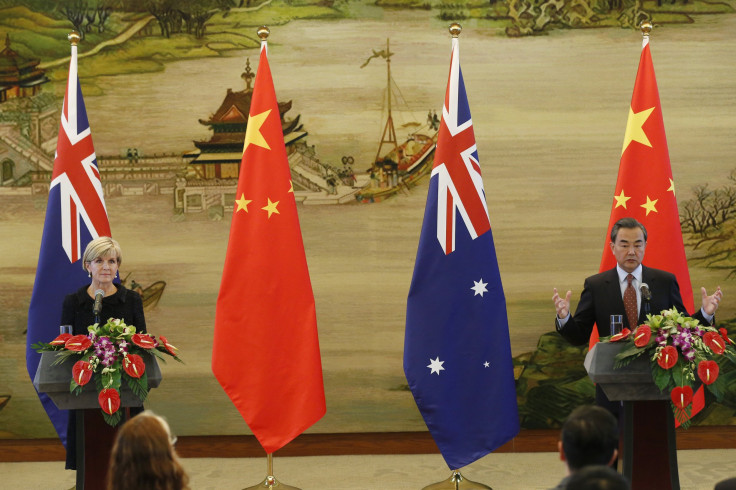
China’s media Wednesday criticized Bishop for her suggestion, made before her arrival in Beijing, that she planned to ask whether other countries could access facilities on the disputed islands held by China, since Beijing had said these were for the public good. The Global Times accused Bishop of “blatant criticism,” and of implying that China was breaching international law. It said Bishop’s comments showed she lacked "any real commitment" to relations with China, with which Australia signed a free trade agreement late last year, and was guilty of "hypocrisy."
Some analysts have argued that the current situation does not represent an immediate "missile crisis” in the Cuban sense, but is part of “a conscious effort by China to progressively extend its strategic footprint in the South China Sea.”
Nevertheless, China’s anxiety at what it sees as U.S. attempts to contain its development appears to have been fueled recently by the announcement of plans to deploy the U.S.-developed Terminal High Altitude Area Defense (THAAD) anti-missile system in South Korea, in response to North Korea’s apparent nuclear test in January and missile launch earlier this month.
Chinese experts have warned that the THAAD system would cover parts of China, and would upset the region’s military balance and raise tensions. In editorials published Tuesday and Wednesday, the Global Times said the THAAD and other military deployments in South Korea were “aimed at China." It said China should voice its objections, install "more defensive missiles in Northeast Asia and take the highest level precautions against the THAAD system," in order to "maintain deterrence ... [and] make other sides think twice before they act.”
The paper argued that recent developments made a war on the Korean peninsula more likely, and said China should "make preparations for the worst-case scenario," and deploy more military strength in its northeast, which borders North Korea. And while it called on the U.S. and North Korea to resolve their differences over the nuclear issue by negotiations, it also said that Chinese “public opinion” would support Chinese military action in the event of a war on the peninsula.
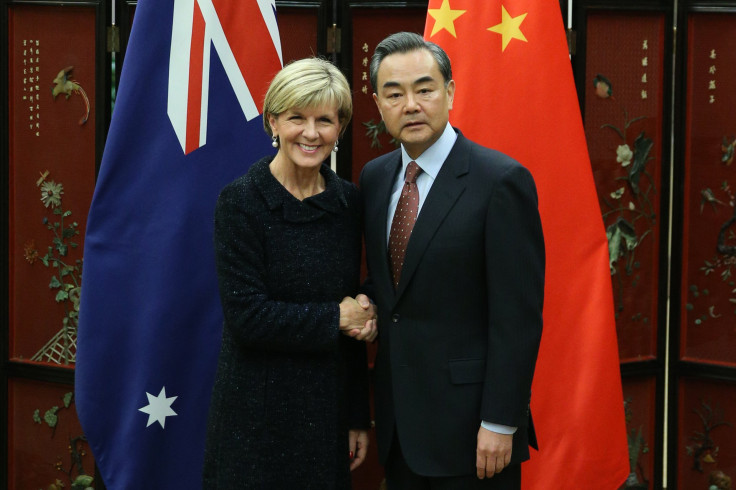
China has said it supports sanctions against North Korea at the U.N. for its nuclear tests, but it has refused to cut off relations with the country, a traditional ally. And the Global Times, which does not always reflect the views of China's policymakers, but is seen to have links to conservative elements within the establishment, added, “China is strongly against any turmoil or war on the Korean peninsula, but once it happens we will not be scared to get involved."
© Copyright IBTimes 2024. All rights reserved.






















